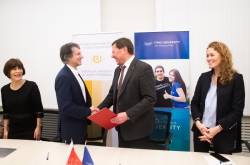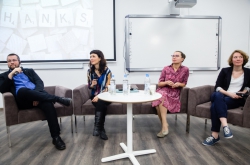Mark Harris writes about tech companies and innovations; amongst his clients are such major titles as The Guardian, IEEE Spectrum, Backchannel, MIT Technology Review, The Economist and New Scientist. He’s also done a series of publications on autonomous vehicles, massive aircraft, AI-based body scanners and other technologies. Apart from being a fellow of the Knight Science Journalism Fellowship program at MIT, he also won the AAS Kavli Science Journalism Gold Award for his story “How A Lone Hacker Shredded the Myth of Crowdsourcing”.
Wayt Gibbs has been working in the field of science journalism for over 25 years. He is currently the executive editor at the Intellectual Ventures investment company, an editor for Scientific American, and a board member of the Northwest Science Writers Association. Gibbs was the editor in chief of the books Modernist Cuisine and Modernist Cuisine at Home, and is collaborating with Nature, Science, Wired, Discover and IEEE Spectrum.
What makes a story interesting
Mark Harris: Readers love stories about how people interact with technologies. You can write about how a technology works, who invented it, how it will influence our lives in the future - still, it is a story about the interaction of man and technology that they want to hear. It is through the lens of such interaction that we can understand how science and technology advance. It is also important to pay attention to details: for example, when talking to scientists, ask them what particular projects or inventions are for.

Wayt Gibbs: A good story is a story that you tell in a stepwise fashion, showing how scientists arrive at a particular technology, discovery or phenomenon, explain what’s so new about it and how it works. If there exists another research team that does similar research, you can describe their work as well, add some competition to the story. Sometimes, you can start your story with an interesting episode, describing a certain situation. You have to show the human aspect of science. Scientists are most interesting people, and their lives are often a mystery to the public, partially because they seldom tell the society about their work.
How to find topics
MH: I study various open data on my topic, talk to experts from the industry in order to understand how companies operate. For me, that is a powerful instrument that helps me to come up with ideas for my stories. Also, there are topics I just like writing abou, like autonomous vehicles, commercialization of technologies, and many other.
WG: You have to constantly read professional literature in order to always be informed of the progress of science in your field. I regularly read Science, Nature and many other titles.

How to learn which topics are best for you
MH: When you are writing about technologies on a daily basis, it’s easy to become trapped writing about the same topics that everyone writes about. This is why it is most important to search for new voices, new ideas. With time, you’ll understand which topics you like most, and the format which is best for you - short reports or long reads. A good idea is to also choose your projects with regard to your current circumstances: there are projects that consume much time, and those that you can complete really fast and make quick money.
How to investigate controversial topics and cross-check data
WG: One time, a group of scientists conducted a research amongst prisoners and discovered a particular biological characteristic in many criminals. This resulted in a proposal to make all people who have this characteristic complete a particular program aimed at eliminating their potential criminal disposition. This is an interesting story, but it would always trigger a great deal of discussion, as well as negative reactions. In this kind of a situation, a journalist has to do their best to be most attentive and cross-check their data by, for example, reviewing the statistics, going over research articles on the matter, and talking to different experts. It might also happen that the conclusions that scientists make in their article don’t correlate with the data they provide. This is why you have to do more than just read one’s CV and the article’s abstract. You should also pay attention to the kinds of relationships the experts you’re consulting have; sometimes, it happens that they “cover” for each other because they graduated from the same university or whatever other reason.

How to treat paranormal research
WG: Different paranormal phenomena, as strange as they may be, also play their role in the development of science. Science can advance by studying anomalies. For instance, not so long ago NASA stated that there might be signs of microbial life in Martian rock samples. This triggered a series of additional research that tried to find other explanations to what exactly was in these samples. Therefore, research on particular strange phenomena can sometimes lead to new important discoveries.
How to communicate with scientists
MH: The most important thing you have to do, you have to do even before the interview: that is, you need to learn as much as you can about this particular scientist and their work. This will help you speak their language, quickly grasp the essence on their work, and win their respect. It might happen that for some reason scientists wouldn’t want to talk to you, but you still have to try to turn the situation over and establish a dialogue. Talking to scientists is something that you definitely have to do, even if they don’t want to.
WG: It often happens that scientists don’t respond to your letters and calls: not because they don’t want to talk to you, but simply because they are preoccupied. Some time back, I was working on a story about searching for the Ninth planet, the second Neptune. There are two scientists who do research in this field and have modeled this planet - Mike Brown and Konstantin Batygin. I had been sending letters to the latter, but he never answered. Then I learned that he is giving an open lecture in Washington DC, where I work. I went to his lecture, asked him a couple of questions, and only then told him who I was. When I told him about the letters, he answered that he is just too busy and often skips letters - so this is why he didn't respond, not because he didn’t want to talk to me. And naturally, scientists are more eager to engage in a conversation if you represent some major title.

How science writing benefits science
MH: I had this story about peculiar small satellites that were designed to provide for communication of IoT devices. They were still in the design stage, and the government was against introducing them, as they found them unsafe. The problem was that the government didn’t fully understand how this technology works; in the end, the developer company just disappeared. This makes one think about the fate of many technologies, and how important it is for people to become more open to new things, to analyze different issues before making decisions.
WG: A rather long time ago, in the mid-90s, I was browsing through research articles in search of ideas for my stories. At that time, I noticed one peculiarity: while scientists from particular regions published articles quite often, scientists from other regions seldom appeared in major publications. I started to wonder whether there was any geographical discrimination. Having contacted different researchers, I learned that my assumption was correct. Oftentimes, articles by scientists who didn’t experience problems with being published when they were living in regions with a high publication activity stopped being accepted by magazines once they moved to, say, Mexico. I checked my results against statistical data, then published a material that got a wide response; it has been discussed at conferences, and many magazines even changed their associated policies.

Make the most of every opportunity
WG: When I was still a student, I used every opportunity to be published: I sent my articles to newspapers and magazines, worked in a group on science communication. After I graduated, I already had quite a portfolio. Then I completed an internship at The Economist, which I got on my second attempt. I started as a reporter in the field of biotechnology. I knew nothing of it at that time, so a glossary on this topic became my desk book. I did my best to become completely immersed in this field in order to write on such topics as genetics and microbiology. When I learned about the Knight Science Journalism Fellow at MIT program, I knew that it is a great opportunity for self-development, even though this program wasn’t aimed at novices. Thanks to it, I got the chance to analyze the possible development of my career and get an impression of the state of science journalism in general.




